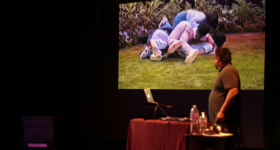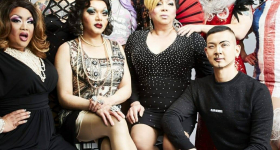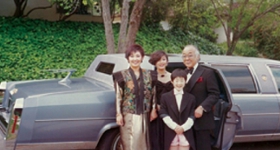Editor’s note: The National Bitter Melon Council was established by a group of performance artists and Asian American activists based in Boston. The council exists to “celebrate the health, social, culinary and creative possibilities of this underappreciated vegetable.”
Across the country, all kinds of people have joined the Movement for Better Living through Bitter Melon: Farmers in New England are growing bitter melon for Community Supported Agriculture collectives; residents are healing bitter feelings by throwing bitter melon “seed bombs” (balls of soil implanted with seeds) anywhere they feel bitter, including vacant lots, private streets and exes’ front lawns; research scientists are studying the efficacy of bitter melon in the treatment of HIV/AIDS and breast cancer; and award-winning chefs such as Gordon Hamersley and Barbara Lynch of Boston are creating bitter melon tasting menus (bitter melon and raspberry sorbet, anyone?).
This unanimous declaration of the National Bitter Melon Coun- cil calls attention to this movement for Better Living through Bitter Melon. In recognition of our right to feel bitter, as individuals and nations, we affirm our inextricable humanity and the interdepen- dence of that humanity on the taste and experience of bitterness.
Herein are our theses on bitter melonism:
- This world cannot be understood through sweetness alone, i.e., embracing only what is pleasing and easy on the (mental, emo- tional, physical) palate.
- This does not mean the embracing of bitterness only; we liken it to the use of “bitters” in a mixed drink to give a hint of complexity at the start and the finish on the tongue.
- Bitter melon cannot create instant community in its own right; however, in its very form (ugly, warty, bitter, “ethnic,” medicinal, “other”) it has proven itself to be a most effective community- building tool. In fact, we find that diverse communities can best be created with a spirit of wonder about foreign-ness. Foreign fruits on local soil build communities based on appreciation of differences.
- This valuing of bitterness is one of the tastes that we cultivate through our performance research-cum-community develop- ment practices.
- To most, bitterness is valued as a negative, repellent fla- vor and emotion. However, fear and avoidance of bitter- ness lead to blandness and flatness in flavor and experience. Therefore, we assert that bitterness should be valued, period.
The National Bitter Melon Council is founded on these persistent values, which we call “the four C’s”:
Community
We claim all of humanity as part of our Bitter Melon community. Bitter compounds in plants evolved as a defense against consump- tion by animals; in fact, amongst mammals, Homo sapiens are the only ones to have developed an appreciation of bitterness, e.g., coffee, tea and chocolate. Therefore, the appreciation of bitterness, the development of a palate for bitterness, is the very thing that defines us as humans!
Commodity
The National Bitter Melon Council promotes the commercial, retail, culinary, health, nutritional and social uses of Momordica charantia (bitter melon). It is a commodity of great value but questionable taste. We realize that its value depends upon the process of coming to terms with its shape and off-putting morphology, as well as its bitter taste.
Cultivation
Growing bitter melon is an adventure. It means risking stares, whis- pers and frowns, as “ugly” and “bitter” are ostracized in favor of “pretty” and “sweet.” The National Bitter Melon Council seeks to eliminate these discriminatory aesthetic judgments. Bitter melon needs to be cultivated on every continent, in every country and by all people. Cultivation is a metaphor for care. Culti- vation is art-making.
Creativity
Creativity is the collective effort of ideas. The National Bitter Melon Council is a peddler of collective effort and generator of ideas in an ongoing creative process.
Local chapters will form wherever young shoots of bitter melon spring up (they’re tasty sauteed and good for you, too!). Join us.
By Hiroko Kikuchi, Jeremy Liu, Misa Saburi and Andi Sutton of the National Bitter Melon Council









Comments